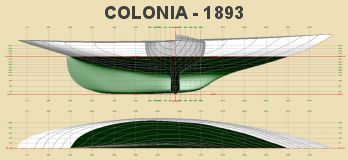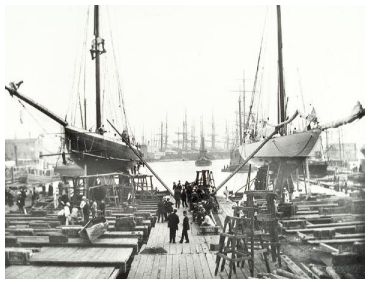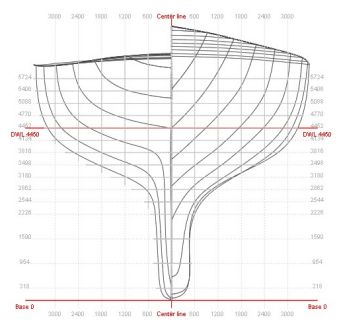Yves GARY Hits: 3295
Category: COLONIA
 Colonia was owned by a syndicate composed of Archibald Rogers, Frederick W. Vanderbilt, William K. Vanderbilt, F. Augustus Schermerhorn, J. Pierpont Morgan, and John E. Brooks. She was built of steel, and was a racing machine, pure and simple, as were all four boats constructed that year with an eye to cup defence.
Colonia was owned by a syndicate composed of Archibald Rogers, Frederick W. Vanderbilt, William K. Vanderbilt, F. Augustus Schermerhorn, J. Pierpont Morgan, and John E. Brooks. She was built of steel, and was a racing machine, pure and simple, as were all four boats constructed that year with an eye to cup defence.
Her dimensions were: Length overall 124 feet; on the water-line 85 feet; beam 24 feet; draft 14 feet.
In type she was an enlarged Wasp. She was the first strictly keel boat built for cup defense. She is not so startling in her design as the other cup defenders, the designers seemingly having tried to reproduce in her all the virtues of the Gloriana and the Wasp. She has the graceful reversed curves seen in the Wasp at the stem, while her sternpost has a moderate rake.  She carries her body well forward and aft, and is sharper at the bows than the Wasp. She has a fullness aft which gives her great power at that point when she heels. There are fifty tons of outside ballast on her keel.
She carries her body well forward and aft, and is sharper at the bows than the Wasp. She has a fullness aft which gives her great power at that point when she heels. There are fifty tons of outside ballast on her keel.
After the Colonia had been sailed about in Narraganset Bay and off Newport she was brought to New-York and placed in dry-dock, where New-York yachtsmen had for the first time a chance to see her under-water body. She certainly gave an idea of great speed, produced by fine lines and scientific designing. The most critical could not call her a "freak" or a "racing machine." She is a yacht legitimately evolved along certain well-defined lines.
Colonia has probably the greatest per cent of ballast to displacement. She is a very powerful boat, and a good representation of the high powered keel. She has the lowest meta centric height of the four, the lowest center of buoyancy, the greatest displacement and the lowest center of gravity of weights, taking the weights of equipment of hull and ballast;  and if anything she has about the same wetted surface as the Vigilant, and at long angles of keel it is probably the most powerful boat of the four. It was no doubt designed for heavy weather.
and if anything she has about the same wetted surface as the Vigilant, and at long angles of keel it is probably the most powerful boat of the four. It was no doubt designed for heavy weather.
She greatly resembles the lines of the Navahoe, but is painted white, with a green bottom.
The sails will be made by Wilson & Silsby of Boston.
Colonia was not a success. In running and reaching, she was the fastest of the quartet of cup defenders, but in going to windward she fell off badly, and was always beaten by the others on this point of sailing.
The reason for this was that she had not enough depth of keel. Her draught was a little over fifteen feet. The Vigi1ant’s draught was twelve feet, with her board up, and twenty-two feet with it down. Good judges claimed that if the Colonia had had a board, she would have beaten the Vigilant. The Herreshoffs did not give her more draught, so they said, because they had not enough water in their yard to launch a deeper boat.
But Herreshoff was on the right track. Two years later, Defender will provide incontestable proof.

Download DELFTSHIP LINES : Delftship file to finish and background images

